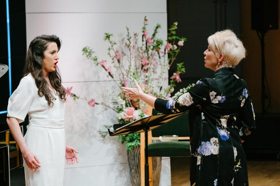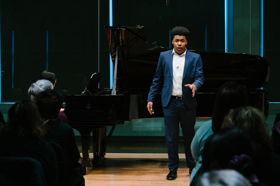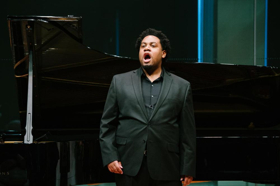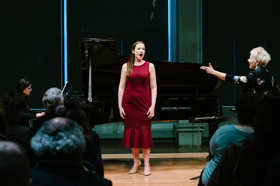BWW Insight: Mezzo Joyce DiDonato Plays Fairy Godmother at Carnegie Hall Master Classes

Photo: Fadi Kheir
Mezzo Joyce DiDonato (JDD) knows quite a bit about being Cinderella--after all, she's played the title characters in Rossini's CENERENTOLA and Massenet's CENDRILLON at the Met and other major opera houses. But it also appears she's a first-rate "fairy godmother," as she proved with a group of emerging artists in a series of Master Classes in Carnegie Hall's Weill Music Room of the Resnick Education Wing last week, which were streamed live on medici.tv and will be available on the great streaming channel free for the next year.
I went to the first of three classes held last weekend and heard her bring her keen sense of what brings a role to life for an audience, as well as what the young performers need to do, bringing her honesty, wit and showmanship into play for their benefit.
The singers participating in the session were from four different range, weight and color categories ("fach"):
- The first was soprano Alexandra Nowakowski, a Polish American graduate of Philadelphia's Academy of Vocal Arts (AVA), who's part of the Washington National Opera's Domingo-Cafritz Young Artist Program this year and displayed a silvery voice and thoughtfulness. Her aria was "Caro nome" from RIGOLETTO.
- She was followed by Israeli mezzo Maya Amir, a student at the Schola Cantorum Basiliensis under Rosa Dominguez, who received some of the most specific interest from DiDonato, since they share a similar repertoire, and ideas that could deepen her understanding of the music she chose, Monteverdi's "Disprezzata regina" from IL CORONAZIONE DI POPPEA.
- Then came tenor Aaron Crouch, the only one of the four I'd heard before. He's a 20-year-old undergraduate at the Curtis Institute in Philadelphia and is part of the world premiere cast of the new Jeanine Tesori-Tazewell Thompson opera BLUE, at the Glimmerglass Festival, which was previewed at the Guggenheim's Works & Process series. He shared concerns about the changes he was undergoing in his vocal range and production. His aria was Mozart's "Il mio tesoro" from DON GIOVANNI.
- Finally, there was countertenor Keymon (Key) W. Murrah, a native of Louisville with a degree in arts administration and minor in music performance from the University of Kentucky, who showed an unusual voice that immediately made the audience sit up and take notice, yet wasn't completely sure about his career direction. His showpiece was Gluck's "Amour, viens render a mon ame" from ORPHEE ET EURYDICE.

DiDonato helped the rising talents begin to find their true selves as performers--something she knows about from her life in the opera world, even though she claims she's no pedagogue and was not there to give lessons. DiDonato was "merely" there to pass along her world of experience on how to live and thrive as a singer. She invited her charges to join her in the sessions and "jump off the cliff together."
So what was the method to her madness? She just didn't critique the music being performed, which included works by Mozart, Gluck, Monteverdi and Verdi in the session I attended. But she also showed them why an aria worked or didn't, and also homed in on the kinds of career choices that the singers would have to make to build a life that was both fruitful and fulfilling: Did they really belong on stage? Did they need to beef up their dramatic abilities? Were they performing the right repertoire? These were just a few of her pithy insights.
At the same time, DiDonato left the members of the audience with a greater understanding of how she herself approaches a role--like her most recent outing at the Met, Sesto in Mozart's LA CLEMENZA DI TITO--in a way that was truly eye-opening. I myself will never listen to her in quite the same way again.

The four singers participating in the two-hour session were, on first hearing, quite developed in their vocal prowess in many ways, at least as far as members of the audience were concerned. But it was also clear as DiDonato begin speaking with them that she had insights many of us had never thought about--but made such good sense that we were left in awe of her abilities.
For example, she warned the soprano about thinking too much about doing something fresh to something like "Caro nome," rather than going back and making believe she was Verdi and thinking about what he was writing. DiDonato became animated when she told her that there shouldn't be "one millisecond that shouldn't sound natural" and to think about building the character so that the strength she shows at the end of the opera--when Gilda sacrifices her life--should seem a natural progression.

DiDonato. Photo: Fadi Kheir
For the mezzo, JDD admitted that it had been quite some time since she last sang the aria--yet we could hear it coming back to her consciousness. She advised the young woman to be careful with her eyes during the aria "because they'll betray you every time." One of her most interesting contributions was to show the difference in effect between a delivery that articulates every note versus using a smooth-as-silk legato.
DiDonato understood clearly that it was difficult for this singer to shift gears from the way that she'd practiced the aria to the way (JDD thinks) it needs to be done. She used different styles for the same line, to show what emphasis can do. She pushed the younger singer to almost force a more animated version of a phrase out of her, asking her "Are you feeling the energy of it?" but still feeling a reluctance of the younger mezzo to change her style. Still, DiDonato told her, "I know you have it in you I know it."
During the course of the master class, DiDonato easily changed her manner, depending on what she considered the needs of the specific singer. This was especially true for tenor Crouch and countertenor Murrah, when she asked both of them to do some thinking overnight before returning for a more thorough session the next day.
Crouch sang a more full-bodied version of his Mozart aria than we often hear, and DiDonato told him that he has "more talent than he knows what to do with" and clearly has a love of singing. The big question for her: How do you nurture it?
The tenor told that for a long time--since he was a child--he had a Lawrence Brownlee type voice, a specialist in Rossini, only to wake up one day and find half his range had disappeared. Her advice: Be patient and take the foot off the gas. "The work ahead would entail disconnecting to sound he thinks about [from the past] from the sound he has [right now]." She warned him that he had to think about the finish line, but admitted that the "long-term view is sometimes hard to keep in mind. She reminded him that the world doesn't need just another opera singer but "We need an Aaron [Crouch] and what he can bring that's unique."
As for the countertenor, who finished the program, his rendition of the Gluck aria from ORPHEE blew the roof off with "a sound that we're not used to hearing from a countertenor." Murrah's big, alto-ish voice has amazing high notes. JDD told him that he had so much that comes naturally, with parts that "we don't want to touch."
Yet, there are things that must be done to make his more than a casual career; at the moment, he has a degree in arts administration and only a minor in performance. She told him that he needs to have a crystal clear vision and that she didn't get "I will do whatever it takes to get there" from him. She told him that he needed to be more "Errol Flynn"--the swashbuckler movie star of the '30s and '40s--and wasn't showing "the swagger we need." (She asked him if he knew Flynn and he answered "No." She replied, "He was before my time, too.")
DiDonato's Master Class--with a couple of brilliant piano accompanists, Justina Lee and Shannon McGinnis--was a fascinating couple of hours to meet singers with extraordinary talent [though none "fully cooked"] and hear the young musicians receive the food-for-thought that could help them become the artists they hope to be.
Take a look for yourself at the Carnegie Hall Master Classes on medici.tv sometime soon. DiDonato is well worth getting to know better!
Comments
Videos

